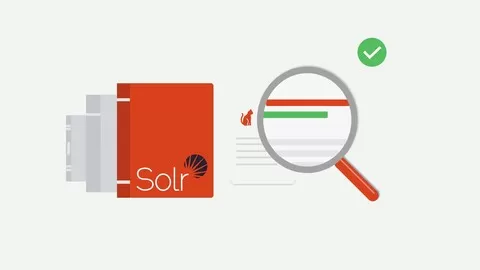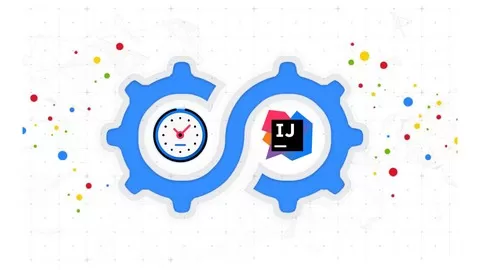Whether you’re handling big data, building cloud-based services, or developing e-commerce web applications, it’s vital to have a fast, reliable search solution.
Introduction to Apache Solr 8 is a quick start guide if you are interested in learning how to leverage a search engine that is optimized to search large volumes of text-centric data. This Udemy course will have you successfully using Solr in no time!
Most of the sections use coding activities to help master the material. All code snippets and commands are available on Github, so you can try them for yourself.
Our goal for each example was that it be easy to use but cover the chapter topic thoroughly. In addition, after almost all video lectures you will have the chance to test your knowledge by answering the quizzes on Udemy.
Apache Solr Online Course Curriculum:
Understanding Search Engines
•Understanding search engines and the issues they address
•How Solr fits in the context of search engines
•Get a good sense of what types of data and use cases Solr supports.
•Typical scenarios for Solr
•You’ll learn about the kinds of problems you can solve with Solr and gain an overview of its key features.
Getting Started with Solr
•How to install and run Solr on your local workstation.
•Introduction to Solr’s core configuration files.
•What is a Solr Core/Collection and how to create it.
•Demonstrate how to index and query a set of example documents that ship with Solr.
•Introduction to Solr’s query form and learn the basic components of a Solr query.
•How to construct queries containing a main query parameter q as well as an optional filter fq.
•You saw how to control which fields are returned using the fl parameter and how to control the ordering of results using sort.
•A brief tour of Solr’s web-based administration console.
Designing our first Solr Application
•Introduce a fictitious web application for finding tweets.
•What a document is in Solr and what characteristics it has.
•We’ll get an overview of how Solr processes documents, to build the index.
Designing the Schema
•Understand what is and when to use the Schemaless mode
•How to manage many of the elements of your schema via The Schema API using HTTP.
•Learn about key design considerations for search applications.
•Discussed considerations about document granularity.
•Learn how to determine if a field should be indexed, stored, or both.
•Learn how to determine if a field should use docValues.
•Use multivalued fields for more complex document structures.
•Understand how dynamic fields are useful for supporting documents with many fields and documents coming from diverse sources.
•Learn how to use Solr’s copyField directive in order to populate a catch-all text search field.
•How to work with structured data using Solr’s support for strings, dates, and numeric field types.
Manipulating the Index
•Get an overview of common request types supported by the update handler.
•Beyond adding new documents, we’ll learn how to update existing documents using Solr’s atomic update support.
•We’ll explain how to guard against concurrent updates using optimistic concurrency control with the special _version_ field.
•We’ll see that after documents are processed, they need to be committed using either hard commits or soft commits for NRT search.
•We also learned how Solr processes query requests using a read-only view of the index with a component called a searcher.
•Explore how to model documents containing other documents using nested documents feature.
•Understand which types of changes require data reindexing, and how to manage the process of reindexing.
•Learn about segment merging and that it’s a good idea to avoid optimizing your index or changing segment-merge settings until you have a better understanding of your indexing throughput requirements.
Text Analysis
•Introduction to text analysis and why is an important part of the search process as it removes the linguistic variations between indexed text and queries.
•Learn how to define field types to do basic text analysis.
•Learn why field types for unstructured text-based fields are normally composed of two separate but compatible analyzers for indexing and query processing.
•Understand why each analyzer is made up of a tokenizer and chain of token filters.
•Test our simple analysis solution using Solr’s Analysis form and see how documents pass through StandardTokenizer and a chain of simple filters to remove stop words and lowercase terms.
Searching
•Uncovering Solr’s capabilities through its numerous and highly configurable request handlers pipeline.
•We discussed how Solr handles queries and filters to get a good understanding of how user queries and filters work: what the difference is, how they interact, and how they ultimately affect the performance and quality of your search requests.
•Describes the syntax and features supported by the main query parser, The Standard Query Parser, included with Solr and describes some other parsers that may be useful for particular situations.
•How to use facets for discovery, analytics, and filtering of search results
•Show top values in any field for matching documents via field facets
•Use range facets to get bucketed counts for numeric and date ranges
Courses » Development » Database Design & Development » Apache Solr » Introduction to Apache Solr
Disclosure: when you buy through links on our site, we may earn an affiliate commission.
Introduction to Apache Solr
Fundamental concepts and use-cases of Apache Solr
Created by
8.6
CourseMarks Score®
Freshness
Feedback
Content
Top Apache Solr courses:
Detailed Analysis
CourseMarks Score®
CourseMarks Score® helps students to find the best classes. We aggregate 18 factors, including freshness, student feedback and content diversity.
Freshness Score
Course content can become outdated quite quickly. After analysing 71,530 courses, we found that the highest rated courses are updated every year. If a course has not been updated for more than 2 years, you should carefully evaluate the course before enrolling.
Student Feedback
New courses are hard to evaluate because there are no or just a few student ratings, but Student Feedback Score helps you find great courses even with fewer reviews.
Content Score
The top online course contains a detailed description of the course, what you will learn and also a detailed description about the instructor.
Tests, exercises, articles and other resources help students to better understand and deepen their understanding of the topic.
This course contains:
Table of contents
Description
You will learn
✓ Install and configure Apache Solr 8 on a server
✓ How to model your data in the real world
✓ How to manage many of the elements of your schema via The Schema API
✓ Index JSON data in Solr using the HTTP Post tool and CURL command
✓ Implement best practices for data reindexing
✓ Get insights into Solr internals-indexing and search
✓ Work with a variety of analyzers and filters
✓ Search full-text and structured data in several different ways
✓ Enhance standard searches with faceting for navigation or analytics
Requirements
• Exposure to JSON-formatted is a plus
This course is for
• System administrators
• Database architects
How much does the Introduction to Apache Solr course cost? Is it worth it?
Does the Introduction to Apache Solr course have a money back guarantee or refund policy?
Are there any SCHOLARSHIPS for this course?
Who is the instructor? Is Lucian Oprea a SCAM or a TRUSTED instructor?
I’m passionate about developing products that are easy-to-use, intelligent, and well-architected. I’m an advocate of writing a well-crafted code that follows best design practices. I seek to bring the same level of passion and completeness to teaching.
8.6
CourseMarks Score®
Freshness
Feedback
Content





